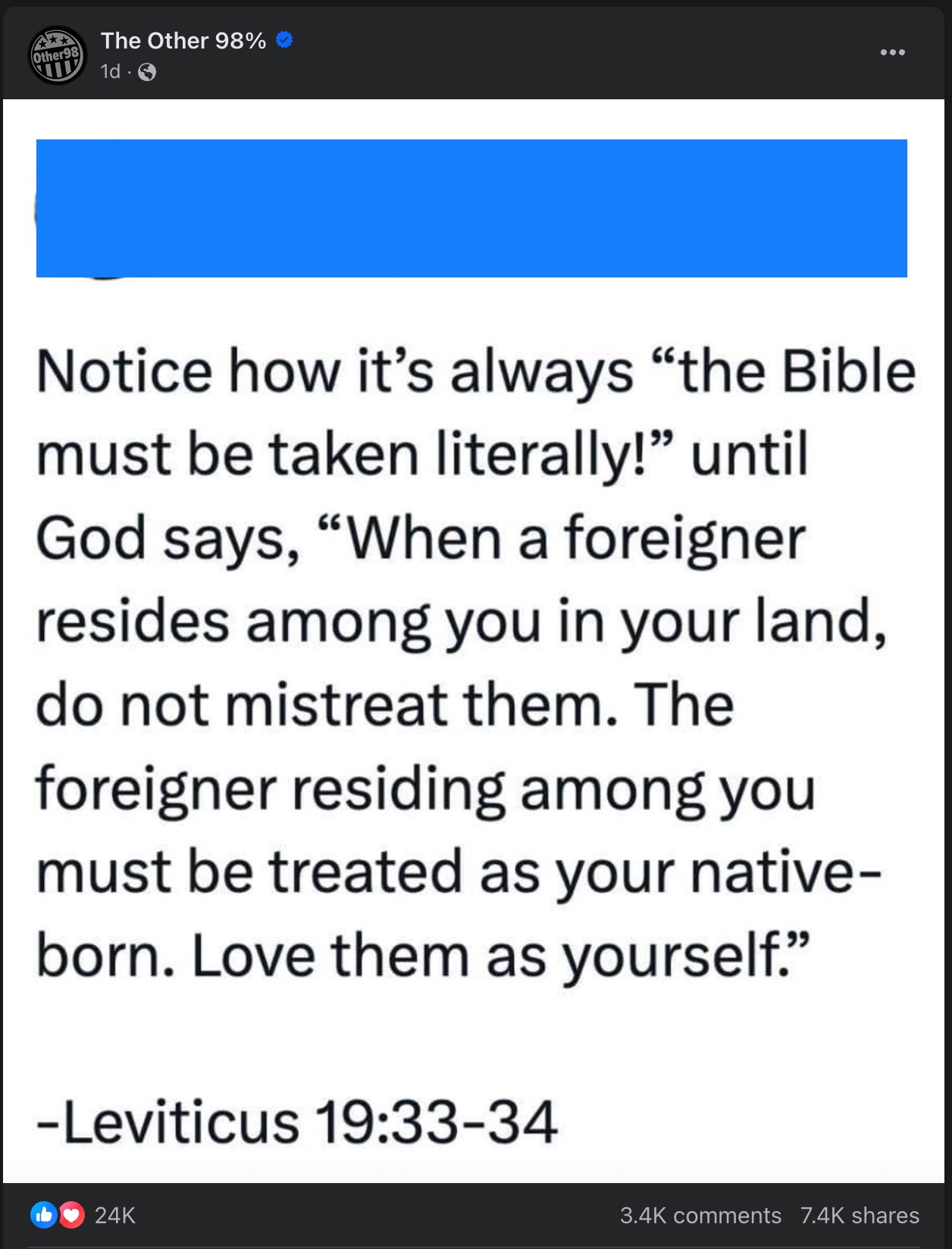
This post is from Facebook and was posted by a left-leaning political activism organization called The Other 98%.1 2 I’m not generally interested in the political aspects of their organization or any organization, but when an acquaintance, who at one time professed to be Christian, shared this, I thought it’d be a good address the merits of this post on my blog (NOTE: I’ve hidden the name of the person who posted this on X as not to positively or negatively promote or encourage direct engagement with him).
Now, to the content of the post…
Flaws in the Post
There’s a significant amount of misunderstanding about this text when it’s used this way. There’s also a significant amount of misunderstanding about Christian beliefs as well. Regarding the Christian who says, “the Bible must be taken literally,” there are a plethora of Christians who indeed make that claim. First, however, they don’t intend that claim for every, single, solitary text; they mean it in a general sense and as a refutation to those who refuse to take most of the Bible seriously (or literally). How do I know Christians mean for “take the Bible literally” to be understood as a generality? Well, I’ll answer that question with a follow-on question: how can you take a literal approach to passages that are demonstratively figurative and where the author meant for it to be that way? Consider Ps. 1:3, which describes the godly man as a tree planted by rivers or Prov. 1:20 which tells of wisdom (her) crying out from the streets. Both authors intended to communicate something less than literal, and it must be read that way to be rightly understood.
Second, there’s a bit of a “straw man” and category error on the part of the poster. It seems he’s ascribing some degree of malevolence to Christians in their Bible interpretation and application. However, generally speaking (as the poster did), Christians aren’t avoiding a literal interpretation when they reach Leviticus 19:33-34. They may, however, place it in a different category than other texts. A solid hermeneutical approach requires consideration for the genre, historical context, and overarching book themes and covenant considerations before making interpretation and application. In light of this, they may fail to see how Lev. 19:33-34 applies in a modern American context.
With the aforementioned explanations of plausible reasons for Christians’ interpretive behavior addressed, I submit to you that it would be more accurate for other to make critiques that say, “Christians seem inconsistent.” This would be closer to the truth, but with a little discussion, one would find that Christians only appear inconsistent. Precise Bible-interpretative rules do not apply in the exact same way in each passage, and not all inconsistencies reflect an error in interpretation. For example, it’s generally true that I don’t break my own windows, but supposing there was a fire in my home and I had to escape, you would understand why I broke my own windows. The difference boils down to the situation. As we’ll see, the same is true for the text cited in the post above—the context or situation is different from New Testament passages.
Examining the Tenets of the Biblical Text
Pertaining to the text in question, Lev. 19:33-34, is (1) an Old Testament/Covenant text and (2) provides instructions to those people at that time. It gives specific instructions to Israel when they enter the Promised Land. The instruction regarding the foreigner is also repeated at other points in the Torah/Pentateuch (e.g., Ex. 23:9). Some of the commands in Leviticus are moral while others are cultural (this distinction is important). While Christians today can apply the principles from the OT, we must first understand that it’s not written as a 21st Century political directive for America’s representative or democratic republic. It was written as a directive for ancient Israel’s theocracy. The text of Lev. 19:33-34 doesn’t command a border policy. It communicates the need to treat the foreigner well knowing the Israelite history, and treating “foreigners” with dignity can be accomplished whether one is for or against current border policies.
To wrap up this post, whether Democrat or Republican, liberal or conservative, those who seek to leverage the Bible for purposes beside serving and honoring God will often make gross errors. In light of my previous commentary, and in fairness to the one who made this post shared by The Other 98%, it’s important to realize that, by application, this Bible text does advocate for proper treatment of foreigners, but what consistutes “proper treatment” must be defined or discussions are futile. At the same time, it’s worth recognizing that “foreigners” in ancient Israel were required to conform to the religious, civil, and theocratic requirements of the nation. They had to honor the God (Y-WH) of Israel and all Creation (rf. Lev. 24:16), and they had to abandon pagan worship practices (rf. Lev. 20:2). The point is that “picking and choosing” from the Bible is dangerous when we don’t have a commitment to the whole of Scripture. No one should seek to extract his own agenda from the sacred text. All Bible advocates have a responsibility to read and interpret it rightly.
1. The Other 98%, accessed 11 Feb 2024.
2. Media Bias Fact Check. This site assesses a heavy political left lean by The Other 98% organization.